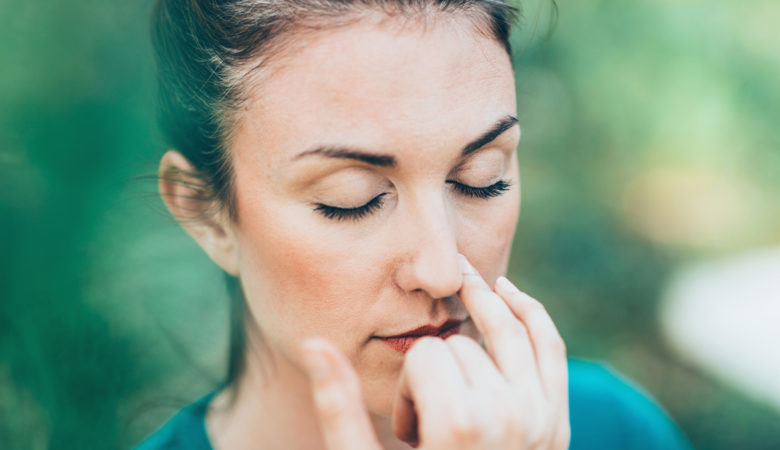Shut Your Mouth! The Science of Breathing Through the Nose

“Just breathe” might sound like good advice, but it vastly underestimates how different types of breathing can accomplish different effects. Most of the time, breathing is an automatic, unconscious bodily function. When we’re stressed, exercising or excited, our breathing can change noticeably.
If you’re not paying attention to your breathing, you’re missing out on the opportunity to manage a basic bodily function for the better. Whether you want to get relief from stress and anxiety, sleep better, focus or wake up, the way you breathe can make a big difference.
Mouthbreathers, it’s time to change your ways
Breathing through your mouth is suboptimal, as any allergy or cold sufferer will tell you. When you breathe through your mouth, it actually transforms your airways. When you inhale through the mouth, it decreases pressure in your airways. The soft tissues in the back of your mouth loosen and flex inward. This creates less space in your airways and makes breathing more difficult—which encourages even more mouthbreathing.
Instead, inhale from your nose. This will force air against the tissues at the back of your throat, widening them so breathing is easier. The more you breathe through your nose, the more toned the tissues and muscles become. They stay open better, which makes it easier to breathe from your nose.
Benefits of deep breathing
Deep breathing offers plenty of benefits, including:
- Activates the parasympathetic nervous system: When you breathe slowly and deeply, you activate the parasympathetic nervous system—the “rest and digest” answer to your “fight or flight” response. Your body conserves its energy to use for other processes, like digestion and urination.
- Activates the vagus nerve: Your vagus nerve controls the parasympathetic nervous system. Your heart rate, digestion and even mood are controlled by the vagus nerve. It will also help your brain and other organs get more oxygen.
- Relieves stress and anxiety: Because deep breathing activates the parasympathetic nervous system and vagus nerve, the more you breathe through your nose, the calmer you’ll feel.
- Improves focus: Deep nasal breathing improves your focus. When you can disregard the fight or flight response, you’ll be calm enough to maintain better focus on other activities.
- Better sleep: Finally, deep breathing can help you get better sleep. As the parasympathetic nervous system is activated, your heart rate slows, body temperature drops and you’ll feel calmer overall. This helps you get better sleep.
Try these breathing exercises
The 5.5 technique
The ideal breathing rhythm is over 11 seconds. Inhale deeply through your nose for 5.5 seconds, then exhale for 5.5 seconds. This adds up to about 5.5 complete breaths per minute. Use a metronome or timer to help get the rhythm right.
Alternating nostrils
Sounds crazy, but the nostril you breathe through makes a difference. When you breathe through your right nostril, your body warms up, your cortisol levels increase, your circulation gets faster and your blood pressure and heart rate follow suit. When you breathe through your right nostril, you’re activating the fight or flight response.
Breathing through the left nostril does the opposite. Breathe through your left nostril to activate the rest and digest response. Your body’s temperature and blood pressure will decrease, while soothing anxiety. It also helps you cut down on negative emotions.
The Wim Hof method
Wim Hof is famous for using cold exposure to boost his biological processes. When you do deep breathing along with cold exposure, you can accomplish a number of things. Your body will release stress hormones like norepinephrine, adrenaline and cortisol, which increases energy and stimulates the immune system. When your body releases cortisol, short-term inflammatory responses decrease. Meanwhile, norepinephrine directs blood flow to the muscles and brain. To try this method, immerse yourself in cold water while deep breathing for several minutes.
Shut your mouth and keep breathing
The breathing exercises above are just a few popular methods, which will help you optimize your biological functions and feel better overall. You don’t have to dunk yourself in an ice bath to reap the benefits of deep breathing, though.
Taking time out of your day, every day, to practice deep breathing will have a cumulative effect. From deeper, better sleep, lessened anxiety and better focus, the way you breathe can make a big difference in your quality of life. As long as you make a point to breathe through your nose—not your mouth—you’re bound to notice a big difference.

